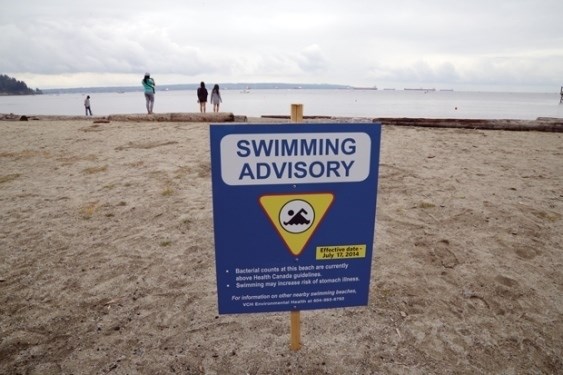There are still suspects but not one culprit when it comes to the rash of E. coli bacteria that kept West Vancouverites stuck in the sand this summer.
The North Shore's medical health officer Dr. Mark Lysyshyn appeared before West Vancouver council Monday to talk about beach closures at Ambleside, Dundarave, Eagle Harbour and Sandy Cove in July and August.
Beaches are closed to swimming whenever the E. coli coliform count rises above 200 bacteria in 100 millilitres of water, which can cause gastrointestinal illness and infection of wounds. The summer's high count was 502, recorded at Eagle Harbour.
There's a lot of contributors to fecal contamination in water, Lysyshyn explained.
However, after rounding up the usual suspects, Vancouver Coastal Health is no closer to identifying the cause, according to Lysyshyn.
The Lions Gate sewage treatment plant was ruled out after a brief investigation, according to Lysyshyn. "We reviewed their testing results and it didn't seem like there was anything untoward," he said.
Some observers suspected the high counts were caused by a cruise ship unburdening itself of sewage but that seems unlikely, according to Lysyshyn.
The vast majority of cruise ships are equipped with onboard sewage treatment that are more advanced than the technology at the Lions Gate sewage plant.
"That water is cleaner than what is coming out of our sewage treatment plants," Lysyshyn said.
Besides being forbidden from discharging sewage within 12 nautical miles of Canada, measured from the tip of Vancouver Island, the cruise ships are also monitored by satellite surveillance.
Animal feces rolling downhill into the water following a heavy rain is still a possibility, according to Lysyshyn.
The E. coli problem was likely exacerbated by dredging at Dundarave Beach and the summer's relatively still waters. "The slow-moving tide definitely contributes to this because once these bacteria are in the water, normally they're being washed out by those tides," Lysyshyn explained.
Asked if waste from another river might have been washing up on West Van beaches, Lysyshyn was noncommittal.
"District staff have told us that logs from the Fraser River come up right on the shore in West Vancouver. I'm not sure if logs float by the same patterns as fecal matter, so we're not really sure."
Expensive studies could be undertaken, but VCH is opting to wait until next year to gauge the situation, according to Lysyshyn. "Judging from the past I would imagine that this won't occur next year."



